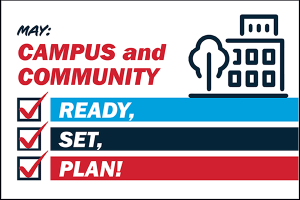May: Campus, Work and Community
 Some of you may be staying near campus over summer break while others will be traveling home or to summer jobs. Wherever you are this summer, remember that disasters can happen at any time, and you should be prepared to act. Take time to learn emergency procedures at your work location. Sign up for emergency alerts in your local jurisdiction. Help ensure sure family/roommates are prepared as well, as you may not be together during an emergency. Know how to make sure you and your loved ones are safe in an emergency, no matter where you are.
Some of you may be staying near campus over summer break while others will be traveling home or to summer jobs. Wherever you are this summer, remember that disasters can happen at any time, and you should be prepared to act. Take time to learn emergency procedures at your work location. Sign up for emergency alerts in your local jurisdiction. Help ensure sure family/roommates are prepared as well, as you may not be together during an emergency. Know how to make sure you and your loved ones are safe in an emergency, no matter where you are.
Goal
Wherever you are this summer—at home, a summer job or on campus—make sure you and your family/roommates can receive, understand and act on information received in an emergency.
Take Action
On Campus or Outdoors
Summertime on campus may not seem that different than in the fall or spring, but it is important to consider how emergencies may differ. Central North Carolina may see strong localized severe weather events that may catch you off guard. High temperatures can also be more impactful with increased outdoor summer activities.
- Be prepared if you need to quickly shelter in place due to severe weather.
- Keep an eye on weather forecasts so you can properly prepare for severe weather or high temperatures.
- Review signs of heat-related illnesses and ways to protect yourself. Here are two great resources:
At Work
If you are spending the summer working at a job or internship, take some time to review emergency plans wherever you go.
- Review company emergency and safety plans. Know where to go if you need to evacuate, shelter in place, or secure in place.
- If your workplace has an automated external defibrillator (AED), know where it is and become familiar with it. Review this hands-only CPR instructional video. Someone’s life might depend on it.
- Make sure your employer has an emergency contact for you in case something happens to you at work.
- If you’re away from home in a new city, become familiar with your surroundings and think about ways you would respond to various types of emergencies.
In Your Community
Being Carolina Ready doesn’t stop once you leave campus. Emergencies can happen anytime and anywhere, so incorporate the Carolina Ready mindset while you are at home this summer to ensure you and your family are prepared.
- Know where to get emergency information. The best information for this will often be found on a county or town government website. Familiarize yourself with their emergency alerts and information.
- Does your community face any unique hazards? Learn how to respond to various emergencies that may impact your community and family. Ask yourself:
- What is your family’s shelter plan?
- What is your family’s evacuation plan?
- Do we need to update/build our emergency preparedness kit?
